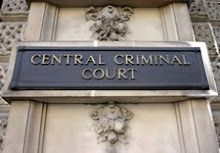OBIT FOR HHJ HENRY POWNALL
His Honour Henry Pownall
DAILY TELEGRAPH online 06/08/2003
His Honour Henry Pownall, who has died aged 76, became one of the Old Bailey's most popular and respected judges after a successful career at the Criminal Bar.
When The Sunday Telegraph ran an article entitled "The Good Judge Guide" in 1987, Pownall was listed among the top 20 members of the bench; he was, furthermore, said to be one of four judges before whom one could hope to have "a less run-of-the-mill, perhaps livelier, more entertaining, more memorable, at any rate more absorbing trial".
Pownall was praised as "a fine judge whose intelligence, tact, fairness and charisma have won him golden opinions. . . He speaks in a warm, velvety baritone and reprimands poor, struggling counsel more in pity than in anger".
As an advocate at the Bar, Pownall's great assets were his charm and obvious fairness, which tended to make juries desperate to accept what he said; he was thus a deadly prosecutor. On the bench, he exhibited a self-deprecating demeanour and unfailing courtesy, as well as an impish sense of humour.
Among the many high-profile cases at which he presided, perhaps the most complicated was the trial of the three men and a woman who had plotted to "cleanse" half of the £26 million worth of gold bullion robbed from the Brinks Mat vault near Heathrow.
At the end of the case, which was beset by fears of "jury nobbling", lasted more than a year, and cost £7 million, Pownall jailed the defendants for between five and 10 years. He told them: "There can hardly have been a more serious case of handling than this."
In 1993 it fell to Pownall to sentence Terry Ramsden, who had pleaded guilty to fraudulently inducing investors to invest £90 million in his company Glen International. A postman's son from Essex, Ramsden had become the archetypal 1980s City whizz-kid, buying racehorses, Walsall football club and being described by the Racing Post as "the biggest punter in history".
Accepting that Ramsden had offended out of criminal financial recklessness rather than dishonesty, Pownall gave him a two-year suspended prison sentence.
In one of his last cases on the bench, in 1999, Pownall dismissed an attempt by City of London police to force newspapers to hand over pictures and notes of the "carnival against capitalism" demonstration, saying that "necessity" had to be convincingly established by the police. With its implied reference to the European Convention on Human Rights, Pownall's judgment was seized on as a landmark decision regarding the incorporation of the Convention into British law.
Henry Charles Pownall was born on February 25 1927; he was the fifth successive generation of his family to supply recruits to the Bar.
On leaving Rugby, Henry joined the Royal Navy, serving on the lower deck in the Mediterranean at the end of the war. Demobbed in 1948, he went up to Trinity, Cambridge, to read Law. Called to the Bar by Inner Temple in 1954, he entered the chambers of G D "Khaki" Roberts, formerly resident leading counsel at Nuremberg, at 2 Harcourt Buildings.
After pupillage, Pownall began practising in criminal cases on the South-Eastern Circuit, much of his work coming from the Bank of England, on whose behalf he prosecuted in banknote cases. He was an understated and quietly effective advocate, punctilious and scrupulously fair as a prosecutor.
He was Junior Prosecuting Counsel to the Crown at the Central Criminal Court (Old Bailey) from 1964 to 1971, and then Senior Prosecuting Counsel from 1971 to 1979, when he took Silk.
Having gained judicial experience as a Recorder of the Crown Court since 1972, and as a Judge of the Courts of Appeal of Jersey and Guernsey since 1980, he was appointed to the bench as Resident Judge at Knightsbridge Crown Court in 1984. He was a Permanent Judge at the Central Criminal Court from 1997 to 1999.
Although he was by nature inclined to say what he thought, Pownall allowed himself to be constrained by his office, but he took the opportunity of his retirement speech, at the Old Bailey's Court One, to deliver a withering indictment of "political correctness in all its horrid forms" and a thinly veiled attack on such directives from the Lord Chancellor Lord Irvine.
Speaking two days after Lord Irvine had launched a revised Equal Treatment Bench Book, a guide for judges on how to avoid any perception of racial bias or insensitivity (including the suggestion that judges should respect the Rastafarian "sacrament" of smoking cannabis), Pownall said: "I find it sad, even offensive, to be bombarded with bumf from on high telling me I must disclose any personal interest I might have which might be seen to have some effect on my judgment - as if I had not conformed since pupillage."
He went on: "There are those who will find prejudice around every corner. They find it where none exists and they find it where none is intended. It is time somebody said there is none of it in this building in any of us. We do as we will be done by."
Henry Pownall was elected a Bencher of the Inner Temple in 1976. He was a Member of the Committee of the National Benevolent Institution and a Freeman of the City of London.
He was an expert on medals and medal ribbons and the possessor of one of the largest collections in the country. A past president of the Orders and Medals Research Society, he was the author of several books on the subject, including Korean Campaign Medals 1950-53.
Occasionally he was to be seen arriving at court with his beloved dog, Muffin, on a lead.
Pownall, who died on July 29, married in 1955, Bettine Deverell, who survives him along with a son and a daughter. Another daughter died in infancy.

No comments:
Post a Comment